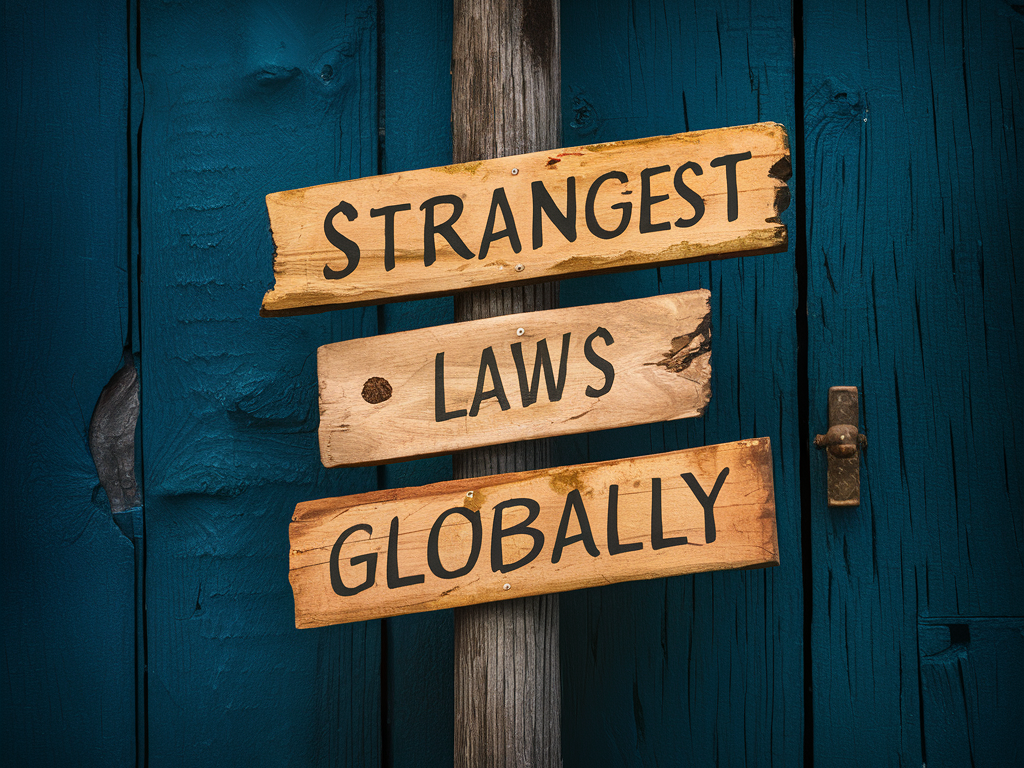
Why Do These Odd Laws Exist?
Ever stumbled upon a law that made you scratch your head and wonder, “Who thought this was necessary?” From bans on chewing gum to restrictions on dying in certain towns, the world is filled with legal oddities that might seem downright bizarre at first glance. But there’s often more to these strange laws than meets the eye.
These curious regulations usually have roots deeply embedded in local cultures, histories, or unique situations that demanded specific legislative responses at the time. For instance, laws that seem humorous or excessive to outsiders might have been practical solutions to very real problems. Understanding these laws gives us a fascinating glimpse into the values, challenges, and priorities of different communities around the globe.
As we dive into some of the strangest laws from various corners of the world, remember that each one tells a story. A story about a place where, believe it or not, these rules make a bit more sense than you might think. And if you’re intrigued by the oddities of legal systems, you’ll love exploring some of the most baffling legal mysteries and courtroom dramas that have puzzled experts for decades, which you can read more about here.
So buckle up, because we’re about to embark on a global tour of legal peculiarities that promise to amaze, enlighten, and occasionally amuse. Let’s get started!

Chewing Gum Ban in Singapore: A Sticky Situation?
Have you ever imagined a place where buying a pack of chewing gum could land you in trouble? Welcome to Singapore, a country known for its pristine streets and stringent laws, where the sale and import of chewing gum have been banned since 1992. This law might seem extreme, but it was enacted for a practical reason: to maintain cleanliness and functioning in public spaces, particularly in the subway system where gum was causing maintenance issues.
Why Such a Strict Law?
The ban was primarily aimed at preventing gum from being stuck on subway doors and seats, which had become a costly and time-consuming issue to clean up. The government decided that the best way to tackle the problem was to eliminate the source. While tourists and locals may find this law a tad inconvenient, it’s a small price to pay for the greater good of clean and efficient public facilities.
Impact on Society
Singapore’s gum ban is often cited as an example of how drastic measures can lead to significant societal benefits. The streets and public transit systems are remarkably clean, and the law is a testament to the city-state’s commitment to order and cleanliness. While some may view this as an infringement on personal freedoms, many Singaporeans appreciate the overall benefits that such regulations bring to their daily lives.
For those facing legal challenges—whether they’re as simple as adhering to local customs or as complex as navigating wrongful convictions—understanding the full context of the law is crucial. Speaking of navigating legal complexities, you might find it enlightening to read about how DNA evidence is reversing wrongful convictions and changing lives, showcasing the profound impact of legal advancements in justice systems worldwide.
Next up, we’ll travel to Italy and discover a law that deals with life and death quite literally. Stay tuned!

The Italian Law Against Dying in Falciano del Massico: Too Full for More Souls?
Imagine living in a place where you’re legally prohibited from dying. Yes, you read that correctly! In Falciano del Massico, a small town in Italy, there’s a law on the books that makes it illegal to die within the town’s limits. This peculiar regulation came into existence because the town lacks a cemetery, and due to a land dispute with a neighboring town, residents can’t be buried nearby.
The Practicality Behind the Impractical
The mayor introduced this law not as a serious enforceable measure but as a symbolic gesture to highlight the absurdity of the bureaucratic red tape surrounding the issue. It serves as a humorous yet poignant reminder of the frustrations that can arise from unresolved administrative disputes. Residents, of course, take the law with a grain of salt, understanding its satirical nature.
Living with the Law
For the people of Falciano del Massico, this law is a part of their unique local lore. It illustrates how laws can sometimes extend beyond practical governance into the realm of cultural expression, reflecting the community’s character and its challenges. While it may sound bizarre to outsiders, it’s a part of what makes their local culture distinctive and memorable.
In the context of bizarre laws, it’s fascinating to see how legal systems can produce outcomes that seem almost fictional. For more on this topic, delve into “the most insane verdicts in courtroom history,” which explores how sometimes, legal decisions themselves can be as unbelievable as the laws that guide them.
Next, we’ll head to Samoa and find out what happens if you forget a special day that’s legally protected. Stay tuned for another surprising regulation from around the globe.

Samoa’s Birthday Forgetfulness Law: Forget to Celebrate at Your Own Risk?
In Samoa, forgetting your wife’s birthday isn’t just a marital misstep—it’s against the law! This unique regulation highlights the cultural importance of family and celebration in Samoan society. While it might seem like an extreme way to ensure spousal harmony, this law serves as a quirky reminder of the value placed on familial relationships and significant occasions in Samoa.
Why Such a Personal Matter Becomes Law
The introduction of this law is more than just a push for remembering birthdays; it’s a reflection of the deep-seated societal norms that cherish and uphold family unity and respect. By legislating this aspect of personal life, Samoa underscores the importance of acknowledging and celebrating loved ones, making it not just a social expectation but a legal requirement.
Cultural Impact and Public Perception
To outsiders, the idea of a legal mandate for remembering birthdays may appear overly intrusive. However, for many Samoans, this law is taken in stride, viewed with a mixture of amusement and pride. It’s a talking point that adds a layer of uniqueness to their cultural identity and legal landscape, showcasing how laws can sometimes function as cultural markers.
Exploring such unusual laws not only gives us insight into the legal frameworks of different countries but also paints a vivid picture of their cultural values and societal priorities. For a deeper dive into local legal peculiarities, take a look at “Missouri’s most bizarre laws,” which offers a glimpse into some of the odd regulations closer to home.
Next up, let’s travel to Poland, where the law takes a particularly protective stance over one of its traditional products. Stay tuned as we uncover the peculiarities surrounding the production of potato spirits in Poland.

The Polish Protector of Potatoes: Licensing the Spirits
In Poland, the production of spirits from potatoes isn’t just a culinary tradition; it’s a matter guarded by law. Anyone wishing to distill potato vodka must have a specific license. This law isn’t just about bureaucracy—it’s a quality control measure designed to protect the health of consumers and maintain the high standards of a national treasure.
Why Regulate Potato Spirits?
The regulation of potato spirits in Poland stems from a concern for public health and a desire to preserve the integrity of one of the country’s most iconic beverages. By requiring a license, the government ensures that only those with the proper knowledge and facilities can produce spirits, reducing the risk of potentially harmful homemade concoctions. This law helps maintain the reputation of Polish vodka as a premium product both domestically and internationally.
Impact on Local Producers and Consumers
For local producers, obtaining a license is a significant hurdle, but it also grants them a mark of authenticity and quality that is highly valued in the marketplace. Consumers benefit from this regulation through the assurance that the spirits they enjoy adhere to stringent health and safety standards. It’s a protective measure that underscores the importance of tradition and quality in Polish culture.
Navigating these regulations requires a deep understanding of the legal landscape, similar to knowing how to choose the right tools for any job. If you’re curious about finding the perfect legal tool for your needs, consider reading about how to choose the best attorney for your case, which offers expert guidance just as essential as knowing the ins and outs of distilling vodka.
Next, we’ll head to Connecticut, USA, where an old law about public behavior on Sundays shows how local customs can shape seemingly odd legal rules. Stay tuned for more quirky laws from around the world!

No Public Kissing on Sundays in Connecticut, USA: A Day of Rest?
In the picturesque state of Connecticut, there exists a law that might seem like a throwback to a much stricter era: it’s illegal to kiss in public on Sundays. This law, like many others that regulate personal conduct, is a remnant from a time when Sunday was strictly observed as a day of rest and religious reflection.
Origins of the No Kissing Rule
The no public kissing law is rooted in the Puritan values that heavily influenced the early legal systems of New England. These laws were designed to maintain moral decorum and ensure that Sundays were kept sacred. Although it’s rarely enforced today, it remains on the books as a curious reminder of the state’s historical values and social norms.
Modern-Day Perception
Today, this law is often met with amusement and disbelief, especially in a society that values personal freedoms and expressions of affection. It serves as a light-hearted example of how outdated laws can linger long after their relevance has faded, providing fodder for discussions about legal reforms and cultural shifts.
For anyone intrigued by how legal boundaries are set and sometimes outsmarted, exploring the world of legal loopholes might offer some fascinating insights. Just like dodging a no-kissing edict, navigating through loopholes requires a keen understanding of the law and its many intricacies.
As we continue our journey exploring the world’s strangest laws, we’ve seen how they reflect the cultural, historical, and even humorous aspects of their respective societies. Each law, no matter how odd it may seem, tells a story about the place it originates from and the people who live there. Stay tuned as we uncover more legal oddities that surprise and enlighten.

More Global Oddities
As we continue our exploration of the world’s strangest laws, let’s visit four more countries, each with its own unique and sometimes baffling legal mandates. These laws not only provoke curiosity but also offer a window into the diverse ways societies govern behavior and manage cultural norms.
It’s Illegal to Run Out of Gas on the German Autobahn
In Germany, the legendary Autobahn is known for sections without speed limits, tempting drivers to push their vehicles to the max. However, running out of gas on these highways isn’t just a potential safety hazard; it’s also illegal. This law is designed to prevent unnecessary stoppages and maintain the flow of traffic, reflecting Germany’s meticulous approach to transportation safety and efficiency.
No Blue Jeans in North Korea
In North Korea, wearing blue jeans is prohibited. This ban is part of broader efforts to limit Western cultural influences, with blue jeans seen as a symbol of American culture. The law showcases the government’s stringent control over personal life and societal norms, illustrating how clothing can become a political statement and a regulated aspect of daily life.
Forbidden Baby Names in Denmark
Denmark takes a unique approach to naming children: parents must choose from a pre-approved list of 7,000 names. If they wish to deviate, they need special governmental approval. This law controls diversity in names and maintains linguistic and cultural heritage, reflecting an interesting blend of governmental oversight and cultural preservation.
Ban on Reincarnation Without Permission in China
In a striking blend of legal authority and spiritual belief, China requires Tibetan Buddhist monks to obtain government permission before reincarnating. This law is seen as an effort to control religious practices and the influence of the Dalai Lama. It’s a vivid example of how laws can intersect with religious freedom and government control, raising complex questions about the limits of legal reach.
Each of these laws, while odd on the surface, is deeply rooted in the cultural, political, or safety concerns of its respective country. They serve as reminders of the varied and often surprising ways that societies choose to govern themselves.
As we reflect on these diverse legal landscapes, it’s clear that the world’s legal systems are as varied as the cultures they represent. For anyone looking to delve deeper into unusual legal territories, understanding Missouri’s most bizarre laws might provide additional insights into how seemingly peculiar laws fit into broader legal and cultural contexts.
As an Amazon Associate we earn from qualifying purchases through some links in our articles.




